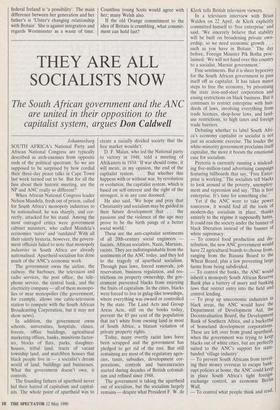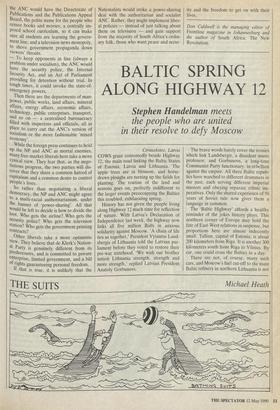THEY ARE ALL SOCIALISTS NOW
The South African government and the ANC are united in their opposition to the
capitalist system, argues Don Caldwell Johannesburg SOUTH AFRICA's National Party and African National Congress are typically described as arch-enemies from opposite ends of the political spectrum. So we are supposed to be surprised by how cordial their three-day peace talks in Cape Town last week turned out to be. But for all the fuss about their historic meeting, are the NP and ANC really so different?
When African National Congress leader Nelson Mandela, fresh out of prison, called for South Africa's monopoly industries to be nationalised, he was sharply, and cor- rectly, attacked for his stand. Among the most outraged critics were government cabinet ministers, who called Mandela's economics 'naïve' and 'outdated'.With all their saintly hysteria, however, the govern- ment officials failed to note that monopoly industries in South Africa are already nationalised. Apartheid socialism has done much of the ANC's economic work.
The government owns the airline, the railway, the harbours, the television and radio services, the post office, the tele- phone service, the central bank, and the electricity company — all of them monopo- lies or near monopolies (the government, for example, allows one cable-television station to compete with the South African Broadcasting Corporation, but it may not show news).
In addition, the government owns schools, universities, hospitals, clinics, forests, office buildings, agricultural marketing offices, banks, munitions factor- ies, blocks of flats, parks, slaughter- houses, tribal land, tracts of vacant township land, and matchbox houses that black people live in — a socialist's dream world of land, buildings and businesses. What the government doesn't own, it controls.
The founding fathers of apartheid never hid their hatred of capitalism and capital- ists. The whole point of apartheid was to create a racially divided society that the free market wouldn't.
D. F. Malan, who led the National party to victory in 1948, told a meeting of Afrikaners in 1934: 'If war should come, it will mean, in my opinion, the end of the capitalist system. . . . But whether this happens with or without war, by revolution or evolution, the capitalist system, which is based on self-interest and the right of the strongest, is in any case doomed.'
He also said, 'We hope and pray that Christianity and socialism may be guided in their future development that . . . the passions and the violence of the age may prove to be the birth pangs of a better social world.'
These are the anti-capitalist sentiments of all 20th-century social engineers fascists, African socialists, Nazis, Marxists, racists. They are indistinguishable from the sentiments of the ANC today, and they led to the tragedy of apartheid socialism. Through pass laws, forced removals, job reservation, business regulation, and res- trictions on property ownership, the gov- ernment prevented blacks from enjoying the fruits of capitalism. In the cities, blacks were forced to live in gulag-like townships, where everything was owned or controlled by the state. The Land Acts and Group Areas Acts,. still on the books today, prevent the 85 per cent of the population that isn't white from owning land in most of South Africa, a blatant violation of private property rights.
Today, many overtly racist laws have been scrapped and the government has pledged to get rid of the rest. But still remaining are most of the regulatory agen- cies, taxes, subsidies, development cor- porations, controls and bureaucracies started during decades of British colonial- ism and refined since 1948.
The government is taking the apartheid out of socialism, but the socialism largely remains — despite what President F. W. de Klerk tells British television viewers.
In a television interview with Brian Walden on 22 April, de Klerk explicitly committed himself to `free enterprise' and said, 'We sincerely believe that stability will be built on broadening private own- ership, so we need economic growth . . such as you have in Britain.' The day before, Foreign Minister Pik Botha proc- laimed: 'We will not hand over this country to a socialist, Marxist government.'
Fine sentiments. But it is sheer hypocrisy for the South African government to pass itself off as capitalist. It has taken minor steps to free the economy, by privatising the state iron-and-steel corporation and easing restrictions on black business. But it continues to restrict enterprise with hun- dreds of laws, involving everything from trade licences, shop-hour laws, and land- use restrictions, to high taxes and foreign trade barriers.
Debating whether to label South Afri- ca's economy capitalist or socialist is not just an academic exercise. The louder the white-minority government proclaims itself capitalist, the more it boosts the emotional case for socialism.
Pretoria is currently running a mislead- ing five-million-rand advertising campaign featuring billboards that say, `Free Enter- prise is working.' The socialists tell blacks to look around at the poverty, unemploy- ment and repression and say, 'This is free enterprise. It's time for something else.'
Yet if the ANC were to take power tomorrow, it would find all the tools of modern-day socialism in place, thanks entirely to the regime it supposedly hates. It could run the society under the banner of black liberation instead of the banner of white supremacy: — To control food production and dis- tribution, the new ANC government would have 22 agricultural boards to choose from ranging from the Banana Board to the Wheat Board, plus a law preventing large farms from being subdivided.
— To control the banks, the ANC would inherit a monopoly South African Reserve Bank plus a battery of usury and banking laws that restrict entry into the field and control lending. — To prop up uneconomic industries in black areas, the ANC would have the Department of Development Aid, the Decentralisation Board, the Development Bank of Southern Africa, and a bucketful of homeland development corporations. These are left over from grand apartheid, when the government was trying to keeP blacks out of white cities, but are perfectly suited to the ANC's support for state- funded 'village industry'. — To prevent South Africans from invest- ing their money overseas to escape bank- rupt policies at home, the ANC could keeP in place South Africa's tight foreign- exchange control, an economic Berlin Wall.
— To control what people think and read, the ANC would have the Directorate of Publications and the Publications Appeal Board, the polite name for the people who censor books and movies; a centrally im- posed school curriculum, so it can make sure all students are learning the govern- ment line; and a television news monopoly, to shove government propaganda down viewers' throats.
— To keep opponents in line (always a problem under socialism), the ANC would have the security police, the Internal Security Act, and an Act of Parliament providing for detention without trial. In tough times, it could invoke the state-of- emergency powers. Then there are the departments of man- power, public works, land affairs, mineral affairs, energy affairs, economic affairs, technology, public enterprises, transport, and so on — a centralised bureaucracy filled with inspectors and officials, all in place to carry out the ANC's version of socialism or the more fashionable 'mixed economy'. While the foreign press continues to hold up the NP and ANC as mortal enemies, many free-market liberals here take a more cynical view. They fear that, as the nego- tiations progress, the two parties will dis- cover that they share a common hatred of capitalism and a common desire to control People's lives.
So rather than negotiating a liberal democracy, the NP and ANC might agree to a multi-racial authoritarianism, under the banner of 'power-sharing'. All that would be left to decide is how to divide the loot. Who gets the airline? Who gets the security police? Who gets the television station? Who gets the government printing contracts?
Other liberals take a more optimistic view. They believe that de Klerk's Nation- al Party is genuinely different from its predecessors, and is committed to private enterprise, limited government, and a bill of rights guaranteeing personal freedom. If that is true, it is unlikely that the Nationalists would strike a power-sharing deal with the authoritarian and socialist ANC. Rather, they might implement liber- al policies — instead of just talking about them on television — and gain support from the majority of South Africa's ordin- ary folk, those who want peace and secur- ity and the freedom to get on with their lives.
Don Caldwell is the managing editor of Frontline magazine in Johannesburg and the author of South Africa: The New Revolution.





























































 Previous page
Previous page